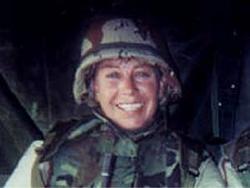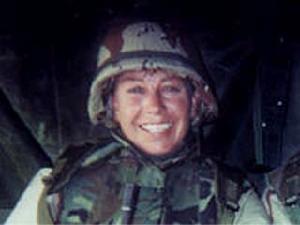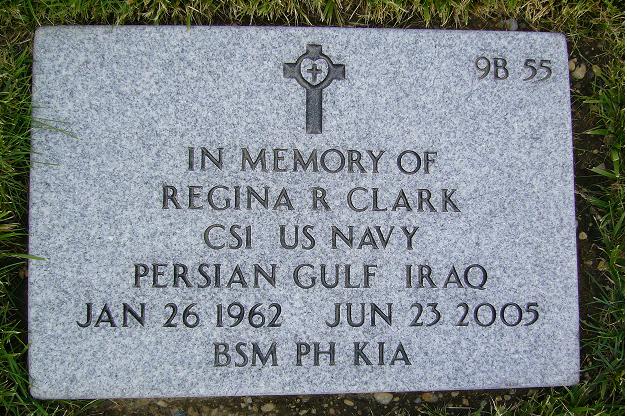But in February, Clark packed her duffel bags and headed for Iraq, where she worked at Fallujah checkpoints conducting security searches on Muslim women.
“She wanted to retire — but she really didn’t have the choice,” said Sherry Haubrick, a longtime friend of Clark’s.
Thursday, Clark, 43, was one of six U.S. troops killed by a suicide bomber who attacked a convoy returning from Fallujah checkpoint duty, according to U.S. military officials. The bombing also resulted in 13 wounded, including 11 women, according to a statement released from the Marine base called Camp Fallujah.
Even in a war that has increasingly put women into peril, Clark did not seem likely to be thrust into frontline duty outside the walls and wire of U.S. military bases.
In civilian life, Clark worked for more than 10 years at the deli and bakery at Fuller’s Market Place in Centralia before tackling a new job as a state corrections officer, according to Haubrick.
Clark lived with her son, Kerry Clark, who graduated from high school last year. Regina Clark’s mother, Mellita Fountain, has occupied a mobile home on the same tract of land.
In the Naval Reserve, Clark, a petty officer first class, was slotted as a mess-hall cook. And preparing food was a big part of her duties in earlier deployments in 2001 and 2003, according to Haubrick.
But this year, as she arrived in Iraq, the Marines, in an effort to be culturally sensitive to Muslim women, sought to find U.S. women to do the checkpoint searches, according to a Marine press release.
Fallujah has been one of the most treacherous towns for U.S. troops and was the focal point of a major U.S. offensive last fall that sought to flush out insurgents. But in a phone call a few weeks ago with her mother, Clark did not talk about the dangers of her job.
“She talked about a new woman friend she had made from Tennessee, and how she hadn’t had a shower in five days,” Fountain said. “She was so happy that I had sent a bunch of baby wipes.”
Fountain and Kerry Clark learned about the death Friday when Navy officers in white suits came to the homestead. By Saturday, as The Chronicle in Centralia published several stories about Clark, television reporters converged on the property.
Asked what he would do now, Kerry Clark told KING-TV, “I don’t know. I’m going to have to figure that out. That’s the hard point. I’ve got friends. Thank God.”
By yesterday, Kerry Clark was unavailable for comment, having flown to New York to appear on a television show, Fountain said.
Regina Clark centered much of her life on her son, according to friends. She was born in Germany but raised in the United States. She joined the Navy and married a fellow sailor, but they separated when Kerry Clark was still a little boy and he was raised by a single mother, according to Fountain.
Though Regina Clark was a sailor through and through, friends say that as Naval Reserves mobilized post-9/11, Clark felt a conflict between her duty as a mother and her duty to serve.
Clark believed strongly in America’s responsibilities as a superpower and didn’t hesitate to go on her first two deployments, which each lasted six months or less, according to Fountain.
While she was gone, Fountain and friends helped look after her son.
Upon her return from her second deployment in 2003, Clark resumed work at Fuller’s deli but said she was disturbed by some of the things she had seen. She talked about retiring from the military, according to Haubrick, who worked with her in 2003 at the deli.
“She said she didn’t feel like herself anymore, and for Regina, that takes a lot — she was very happy-go-lucky,” Haubrick said.
Clark’s third deployment initially was supposed to begin last year, before her son’s high-school graduation, Haubrick said.
But Clark was able to work a deal to postpone that deployment to this year and to take on the assignment that landed her in Fallujah, which would be her last deployment before retirement.
As Clark prepared to depart for this final round of duty, she still strongly supported the U.S. mission and President Bush, according to Fountain.
“I have a feeling that we shouldn’t have been there, and made a remark about President Bush,” Fountain said.
“She said, ‘That’s my leader and commander in chief you’re talking about.’ “
But in February, Clark packed her duffel bags and headed for Iraq, where she worked at Fallujah checkpoints conducting security searches on Muslim women.
“She wanted to retire — but she really didn’t have the choice,” said Sherry Haubrick, a longtime friend of Clark’s.
Thursday, Clark, 43, was one of six U.S. troops killed by a suicide bomber who attacked a convoy returning from Fallujah checkpoint duty, according to U.S. military officials. The bombing also resulted in 13 wounded, including 11 women, according to a statement released from the Marine base called Camp Fallujah.
Even in a war that has increasingly put women into peril, Clark did not seem likely to be thrust into frontline duty outside the walls and wire of U.S. military bases.
In civilian life, Clark worked for more than 10 years at the deli and bakery at Fuller’s Market Place in Centralia before tackling a new job as a state corrections officer, according to Haubrick.
Clark lived with her son, Kerry Clark, who graduated from high school last year. Regina Clark’s mother, Mellita Fountain, has occupied a mobile home on the same tract of land.
In the Naval Reserve, Clark, a petty officer first class, was slotted as a mess-hall cook. And preparing food was a big part of her duties in earlier deployments in 2001 and 2003, according to Haubrick.
But this year, as she arrived in Iraq, the Marines, in an effort to be culturally sensitive to Muslim women, sought to find U.S. women to do the checkpoint searches, according to a Marine press release.
Fallujah has been one of the most treacherous towns for U.S. troops and was the focal point of a major U.S. offensive last fall that sought to flush out insurgents. But in a phone call a few weeks ago with her mother, Clark did not talk about the dangers of her job.
“She talked about a new woman friend she had made from Tennessee, and how she hadn’t had a shower in five days,” Fountain said. “She was so happy that I had sent a bunch of baby wipes.”
Fountain and Kerry Clark learned about the death Friday when Navy officers in white suits came to the homestead. By Saturday, as The Chronicle in Centralia published several stories about Clark, television reporters converged on the property.
Asked what he would do now, Kerry Clark told KING-TV, “I don’t know. I’m going to have to figure that out. That’s the hard point. I’ve got friends. Thank God.”
By yesterday, Kerry Clark was unavailable for comment, having flown to New York to appear on a television show, Fountain said.
Regina Clark centered much of her life on her son, according to friends. She was born in Germany but raised in the United States. She joined the Navy and married a fellow sailor, but they separated when Kerry Clark was still a little boy and he was raised by a single mother, according to Fountain.
Though Regina Clark was a sailor through and through, friends say that as Naval Reserves mobilized post-9/11, Clark felt a conflict between her duty as a mother and her duty to serve.
Clark believed strongly in America’s responsibilities as a superpower and didn’t hesitate to go on her first two deployments, which each lasted six months or less, according to Fountain.
While she was gone, Fountain and friends helped look after her son.
Upon her return from her second deployment in 2003, Clark resumed work at Fuller’s deli but said she was disturbed by some of the things she had seen. She talked about retiring from the military, according to Haubrick, who worked with her in 2003 at the deli.
“She said she didn’t feel like herself anymore, and for Regina, that takes a lot — she was very happy-go-lucky,” Haubrick said.
Clark’s third deployment initially was supposed to begin last year, before her son’s high-school graduation, Haubrick said.
But Clark was able to work a deal to postpone that deployment to this year and to take on the assignment that landed her in Fallujah, which would be her last deployment before retirement.
As Clark prepared to depart for this final round of duty, she still strongly supported the U.S. mission and President Bush, according to Fountain.
“I have a feeling that we shouldn’t have been there, and made a remark about President Bush,” Fountain said.
“She said, ‘That’s my leader and commander in chief you’re talking about.’ “



